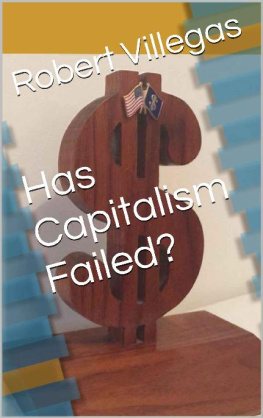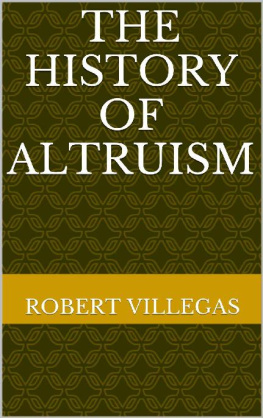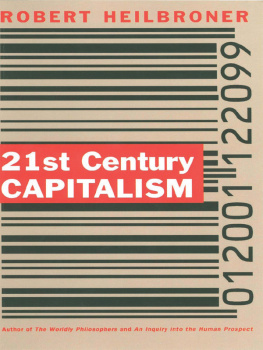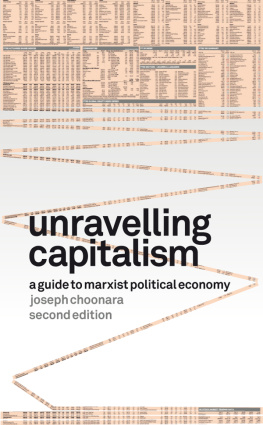Robert Villegas - Has Capitalism Failed?
Here you can read online Robert Villegas - Has Capitalism Failed? full text of the book (entire story) in english for free. Download pdf and epub, get meaning, cover and reviews about this ebook. year: 2016, publisher: Createspace Independent Publishing Platform, genre: Politics. Description of the work, (preface) as well as reviews are available. Best literature library LitArk.com created for fans of good reading and offers a wide selection of genres:
Romance novel
Science fiction
Adventure
Detective
Science
History
Home and family
Prose
Art
Politics
Computer
Non-fiction
Religion
Business
Children
Humor
Choose a favorite category and find really read worthwhile books. Enjoy immersion in the world of imagination, feel the emotions of the characters or learn something new for yourself, make an fascinating discovery.
- Book:Has Capitalism Failed?
- Author:
- Publisher:Createspace Independent Publishing Platform
- Genre:
- Year:2016
- Rating:5 / 5
- Favourites:Add to favourites
- Your mark:
- 100
- 1
- 2
- 3
- 4
- 5
Has Capitalism Failed?: summary, description and annotation
We offer to read an annotation, description, summary or preface (depends on what the author of the book "Has Capitalism Failed?" wrote himself). If you haven't found the necessary information about the book — write in the comments, we will try to find it.
Has Capitalism Failed? — read online for free the complete book (whole text) full work
Below is the text of the book, divided by pages. System saving the place of the last page read, allows you to conveniently read the book "Has Capitalism Failed?" online for free, without having to search again every time where you left off. Put a bookmark, and you can go to the page where you finished reading at any time.
Font size:
Interval:
Bookmark:
Has Capitalism Failed?
By
Robert Villegas
Has Capitalism Failed?
By Robert Villegas
Copyright 2016 by Robert Villegas. No part of this book may be reproduced in any manner without the express written agreement of the author and his designated legal authority. All Rights Reserved.
Published in the USA
ISBN 978-1534700048
Library of Congress Control Number: 2016910633
Table of Contents
if an Englishmanor for that matter, any other man in any country of the worldsays today to his friends that he is opposed to capitalism, there is a wonderful way to answer him: You know that the population of this planet is now ten times greater than it was in the ages preceding capitalism; you know that all men today enjoy a higher standard of living than your ancestors did before the age of capitalism. But how do you know that you are the one out of ten who would have lived in the absence of capitalism? The mere fact that you are living today is proof that capitalism has succeeded, whether or not you consider your own life very valuable.
The truth of this statement is important when one considers the efforts to destroy and replace capitalism by our politicians, college professors, intellectuals and street protestors. We have most likely all seen pictures of mobs carrying signs and banners, Capitalism has Failed and Capitalism is Evil. Virtually none of the people carrying these signs would be alive today were it not for the fact that capitalism was allowed to flourish in the 19 th century. None of us would have the benefit of modern medical science, automobiles, airplanes, cell phones, television, movies and the Internet were it not for the fact that the genesis of these life-saving modern instruments was an age of full unregulated capitalism.
What would happen if the world decided to do away with all profits? Do you know? The socialists would say that their system, and particularly they, as leaders of society, would still be able to generate all the wonderful products ascribed to capitalism. They would cry that their creation of rights to jobs, health care, education, day care, retirement and whatever other rights they imagine will create a new world of abundance and life will be better for everyone. They assure us that they are kindly and good people and would never allow government to become dictatorial and oppressive like other socialist governments in the past. Their socialism would be democratic; kind and approved of by the people. It would not dictate or force anyone, and, this time, the people would vote on all measures.
Today, young socialists declare themselves part of the We Generation. They think that collective action will finally be accomplished because they, in their infinite wisdom, will finally make it work. Unlike the foolish people of the past, they really mean it this time ; they intend to complete the promise of collective action through sacrifice.
Needless to say, we foolish people of the past, chuckle at the naivet of these promises and point out that past socialist leaders also meant it. Indeed, they meant it so much that they sent millions into the ovens, prisons and concentration camps millions comprising the enemies of socialism; the selfish people who did not chuckle as they were directed by men with rifles to get in line and experience the justice of the collective ideal known as socialism.
I wrote this book to provide my thoughts about the fundamental principles and events that are going to affect our lives during the coming years. I think it is important that hard working citizens learn the real issues that affect their lives and take definitive action to stop government when it steps out of bounds. The Constitution, as it was originally written, does not allow the government to violate the rights of citizens, even if those citizens are part of the We Generation, wise, wonderful and self-sacrificial.
In this book, we are going to take a look at capitalism and decide if it really has failed. We will look at capitalism from the perspective of the individual and even attempt to analyze the criticisms of capitalism made by those wise socialists who seem to have all the answers for the lives of men.
Has Capitalism Failed?
I hope you agree with me that proposals to make monumental changes in our economic system should be made while armed with all of the facts. I ask my readers to clear the slate in their minds about the evils of capitalism and have an open mind. Like many of us who advocate capitalism, we decided to make sure we understood capitalism before we let the monsters with rifles come onto our streets and tell us how to live our lives. I suggest that you do the same before you decide to pick up a rifle and/or throw a Molotov Cocktail through a bank window.
The capitalist system was termed capitalism not by a friend of the system, but by an individual who considered it to be the worst of all historical systems, the greatest evil that ever had befallen mankind. That man was Karl Marx. Nevertheless, there is no reason to reject Marxs term, because it describes clearly the source of the great social improvements brought about by capitalism. Those improvements are the result of capital accumulation; they are based on the fact that people, as a rule, do not consume everything they have produced, that they saveand investa part of it.
The main business of American industry is production, not theft or forgery. Only the influence of an anti-capitalist philosophy that focuses moral worth primarily upon sacrifice could cloud men's minds to the exacting kind of virtue required of the men who choose to be productive. If you wonder why some CEOs make so much money, it is because their leadership enables their corporations to successfully sell to and benefit more people than other companies. Capitalism is about the efficient use of capital and that involves the efficient production of quality products, sold at a price customers are willing to pay and delivered cost-effectively and quickly. If you think that just anyone can do this, you have no idea how to do it.
And it is this same misunderstanding of capitalism that moves many people to damn man for being too concerned with materialistic things; that tells man he has produced too much and should give away the fruits of his production. It tells him that to produce is so easy, but to give so hard. It is blind to man's true greatness because it refuses to regard production as an essential, necessary and highly desirable virtue. And because it does not really protect the rights of people to be moral, this anti-capitalist philosophy lets loose the most radical of haters; the people who would just as soon crush the skull of an honest man rather than ask him for a job.
It is this same philosophy that advocates a welfare-state to forcibly divest men of their incomes for the sake of the nonproductive. And, finally, it is the same philosophy that refuses to consider that a capitalist society can do more good (even for the nonproductive) than any welfare society. To prove this last point, we will analyze some of the essential elements of capitalism, their causes, and their consequences. They are mass production, the division of labor, capital accumulation, corporate organization and monetary policy.
MASS PRODUCTION
A uniquely capitalist invention is the concept of mass production that lowers the cost of production and spreads the benefits to virtually all parties in society. Mass production enables the making of complex products on an assembly line which employs many workers, each performing a specific task in a pre-determined sequence that results in the creation of products such as automobiles, guns, farm machinery, turrets and lathes and even such small products as cell phones, furniture, television sets and other electronic equipment to name a few. The benefit of the production process is that highly valued products can be built efficiently and in a very timely manner at a very low price compared to products made by a single individual.
Font size:
Interval:
Bookmark:
Similar books «Has Capitalism Failed?»
Look at similar books to Has Capitalism Failed?. We have selected literature similar in name and meaning in the hope of providing readers with more options to find new, interesting, not yet read works.
Discussion, reviews of the book Has Capitalism Failed? and just readers' own opinions. Leave your comments, write what you think about the work, its meaning or the main characters. Specify what exactly you liked and what you didn't like, and why you think so.









